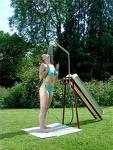|
Did you know that 93% of Kauai's electricity is coming from burning fossil fuels? Did you know that 100% of Hawaii's fossil fuels are imported?
It doesn't take a college degree in Sustainability to realize that it might be wise to find something a little closer to home for household energy needs. Let's take a walk outside with some people on Kauai who are already thinking about this issue. Wait, better stop and put on your sunscreen first!
Sharry Glass is a member of Apollo Kauai. Apollo Kauai is a grass roots sustainable energy advocacy group assisting Kauai to use more renewable and sustainable sources of energy.
"40% of most personal electric bills comes from hot water,."Sharry Glass said. "The biggest difference a home owner can make in the electric bill is to install a solar hot water heater. An if you have teenagers in the house, the savings might be even more," she laughingly added.
A residential solar hot water system can pay off in 2 years, and a system lasts between 15-20 years.
Sharry isn't reading from the back of a solar energy manual or sales brochure. Sharry and her husband Steve have ample first-hand experience harnessing solar and wind power around the world aboard their sailboat and have been using solar power on their Wailua Homesteads house for more than 20 years.
"Our first solar heating system lasted 20 years and after the first two years, all the years of hot water are free!" Sharry said excitedly.
Ben Sullivan, Apollo's former chair, said solar hot water heating is a basic choice without compromises to the end user.
Solar hot water heaters cost about $5,500 dollars to install yet can save families thousands of dollars in energy costs and reduce Hawaii's reliance on imported oil for purposes like heating water.
“Tremendous energy savings are available,” he said, noting that a system will typically pay for itself in about two years with state and federal tax credits.
Sullivan said he considers it a litmus test for society in stepping up to finding solutions for trends in energy consumption.
Some of Kauai’s long time residents have already passed the litmus test. Most of the island of Kauai was without hot water or electricity for about three months after Hurricane Iniki destroyed the island power infrastructure, yet sailors in Nawiliwili Harbor with small wind generators and 12 volt appliances were making margaritas in the blender, even if the boats were washed up along the shoreline after the storm.
Kauai resident Katherine Fisher noted, "Our passive solar hot water system survived the storm, and we felt very fortunate to have hot water for showers and washing even while living by candlelight and cooking fresh-caught lobsters on a grill. Funny how just having hot water can turn a hardship into a romantic holiday. Living post-hurricane was a great example of testing a community for sustainability.”
Some good litmus test questions to ask are: Can we plan ahead? Are we dependent on imported resources of fuel and food? Do we grow our food nearby? Are the oceans healthy and full with fish? If the grid goes down, how do we stay warm (or cool) and clean and healthy? Do we support our hunters, fishermen, farmers? Are Hawaii's soils, farmlands, forests and waters healthy and protected? Or are they decaying? Is the Hawaii National Guard adequately staffed and prepared to handle local natural disasters?
Kauai County Councilwoman JoAnn Yukimura has been working with advisory and community groups for the past several years, and has plans to introduce a bill at the local level that could encourage the transition to solar.
A study of the life-cycle costs of solar water heating versus electric or gas water heating shows that a family can save roughly $20,000 over the system’s 15-year life at today’s oil prices, Yukimura said.
Yukimura said an estimated 40 percent of an average home’s energy costs comes from heating water.
To remove this financial burden from families would be a “huge boon to the general welfare of the island,” Yukimura said.
“Savings are likely to be far bigger because prices are going to go up,” she said. “The sooner families do this, the better.”
The proposed ordinance would require solar hot water heaters for all new single-family units and duplex residential construction on Kauai.
“We are moving as a global community from cheap, abundant fossil fuel to scarce, expensive fossil fuel,” she said. “We need to protect our community against ever-rising prices and dependence on fossil fuels.”
Savings are not limited to home owners. On Kauai, renters tend to stay in their homes longer than the national average of 5 years. If the renter is paying utilities, he or she might make an agreement with the owner to cost-share so both will benefit.
"But it really has to come from the owner doing the right thing. Every time you reduce your electric bill when that electricity comes from burning fossil fuels, you are reducing your contribution to global warming," says Sharry.
In addition to solar, Kauai is exploring other natural resources for renewable and sustainable energy.
Kauai has just put up a testing tower for wind farm generation on Hawaiian Homelands. They are examining migratory bird patterns and wind patterns; the answer is still several years away. The goal is to produce 10 megawatts from that wind farm. Kauai, during peak time, uses about 70-80 megawatts daily.
Sharry also urged people to explore photovoltaic cells as a non-variable output resource. The public is also encouraged to continue to work with KUIC, the island’s cooperative electric utility company, to meet Kauai's energy needs with increased efficiency by integrating other energy sources.
Sharry noted that Apollo meetings are held on the second Thursday of each month. The public is invited to all meetings. “The more community participation we have, the more quickly we can become more energy sustainable. "
For more information, call Sharry Glass at 822-7351.
|




















